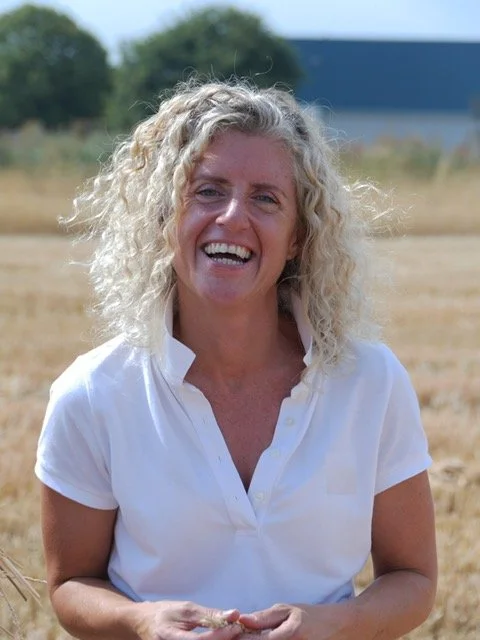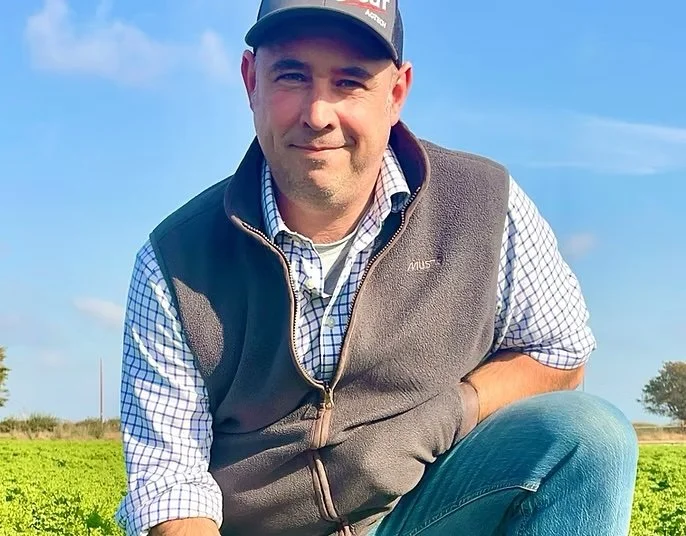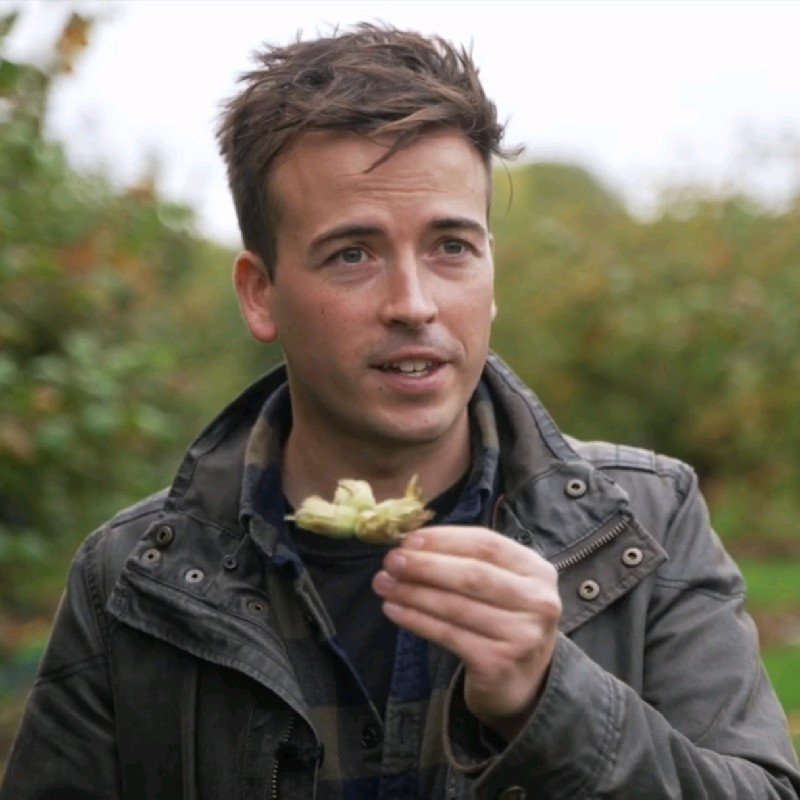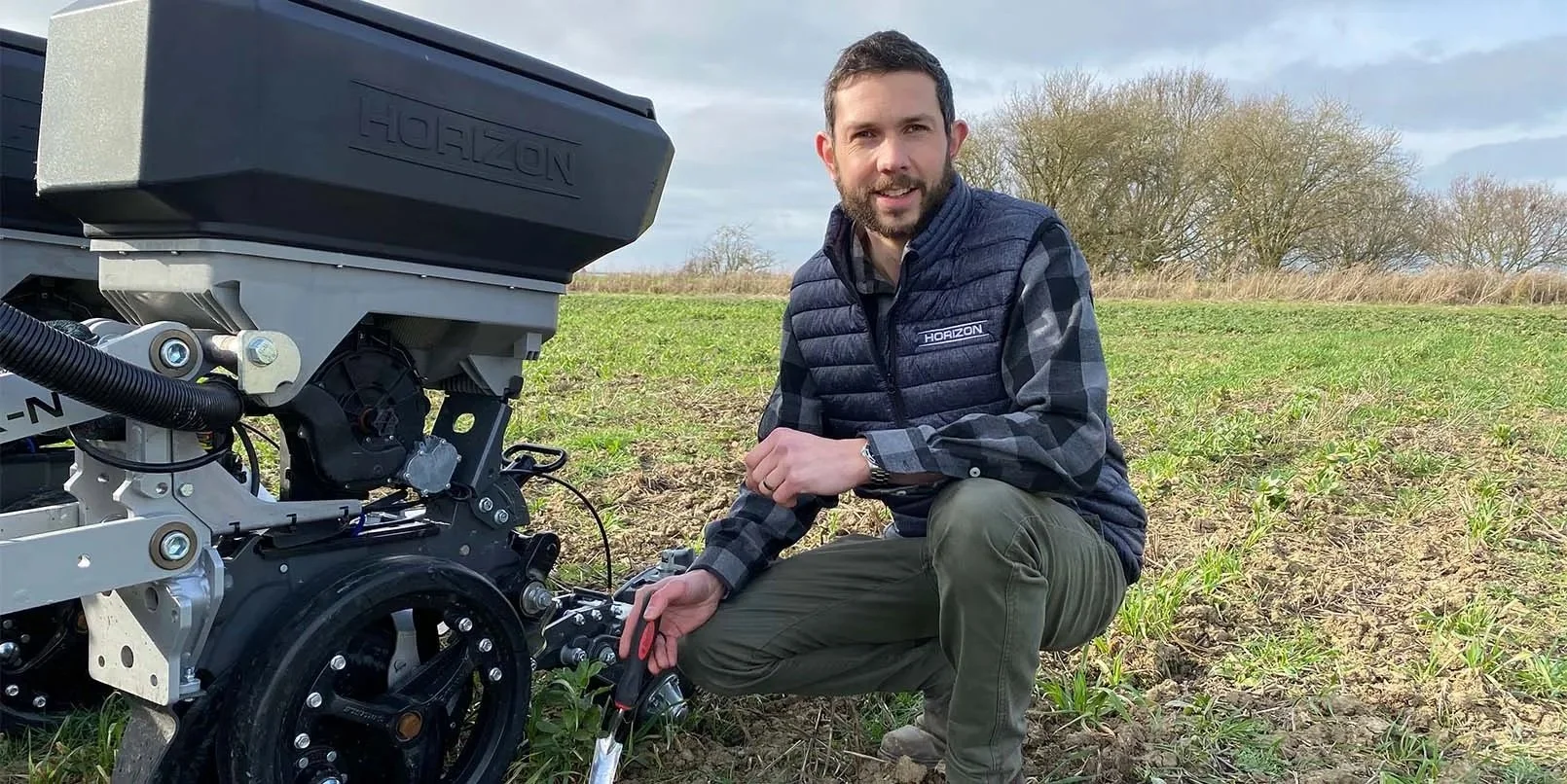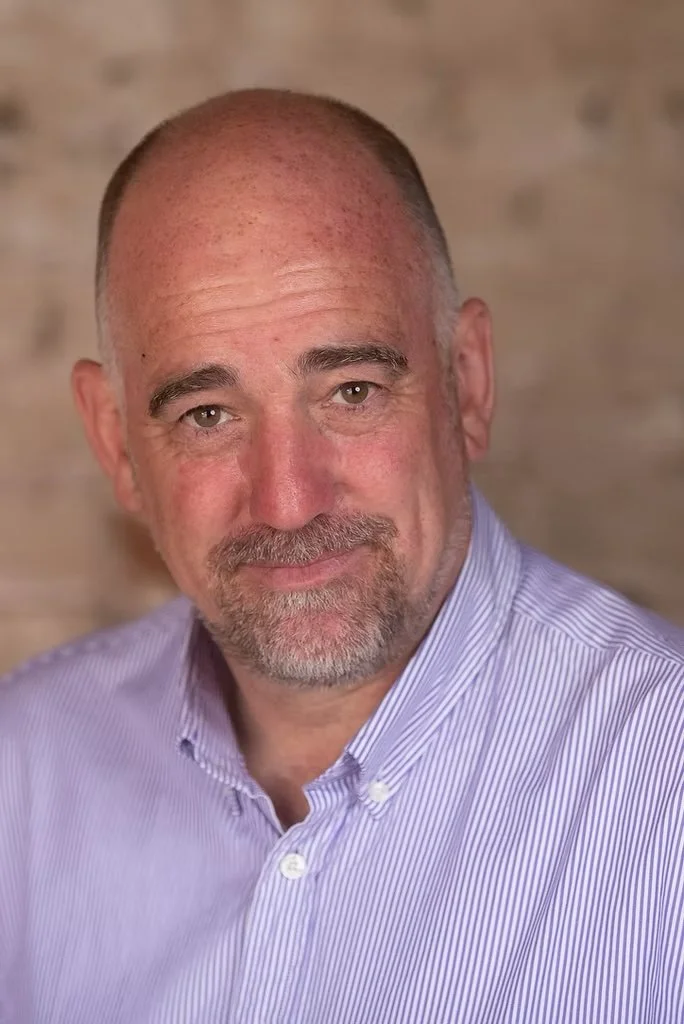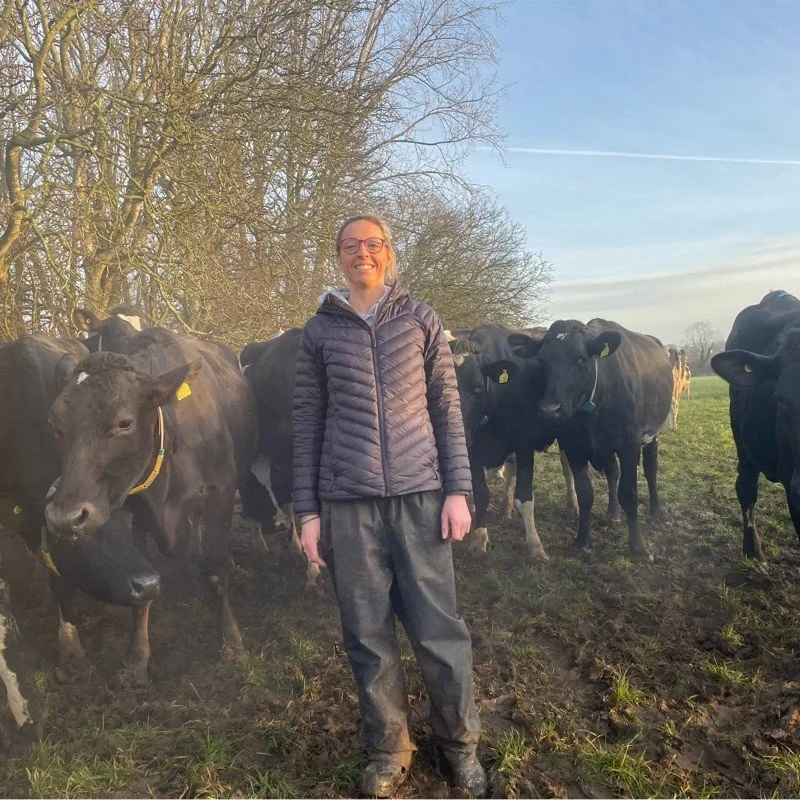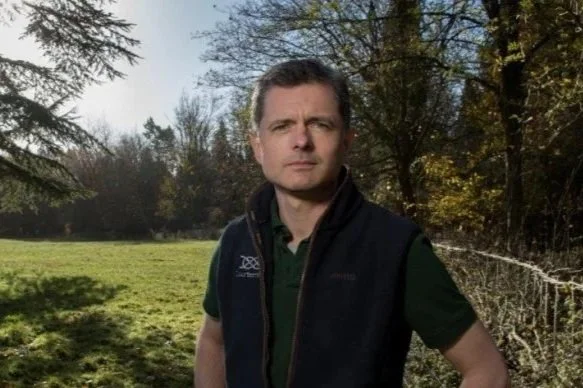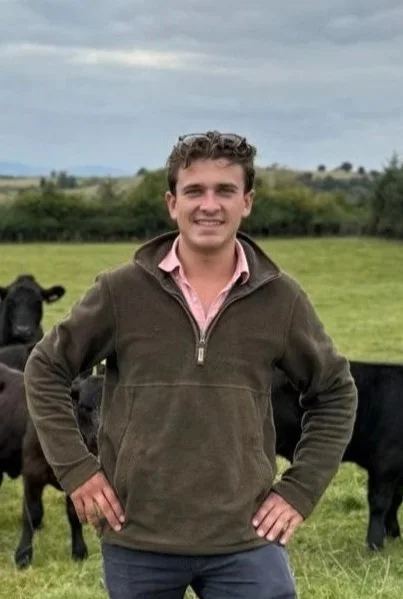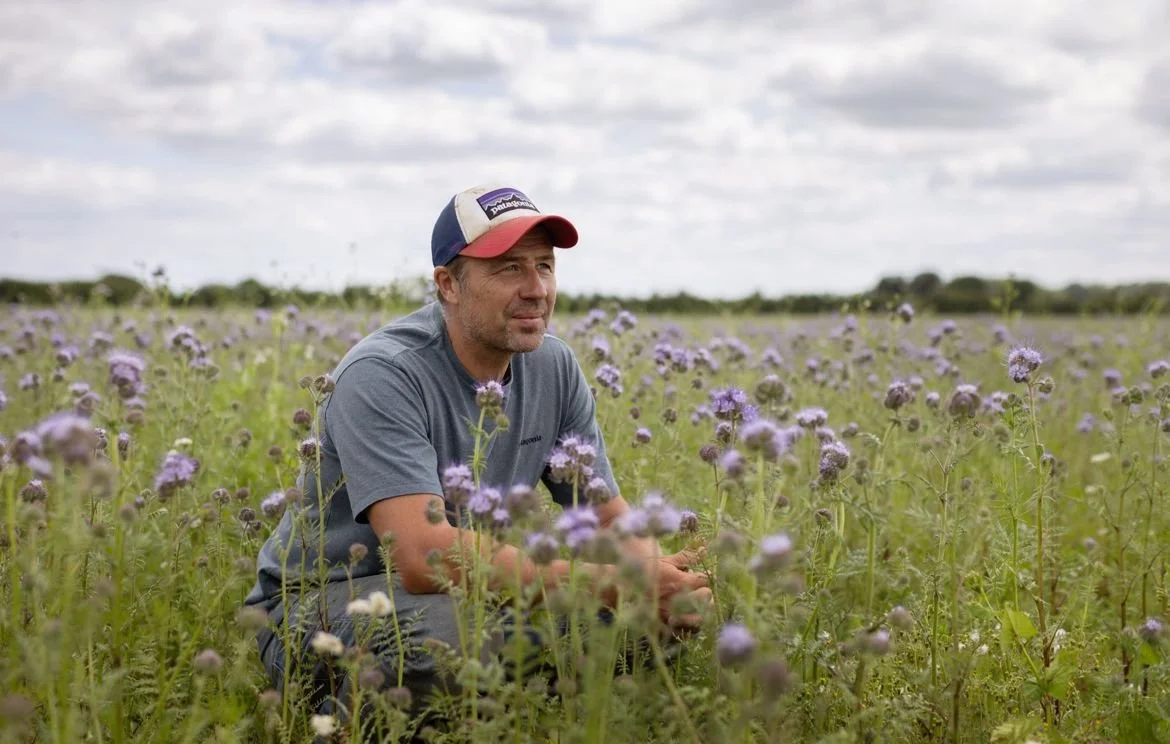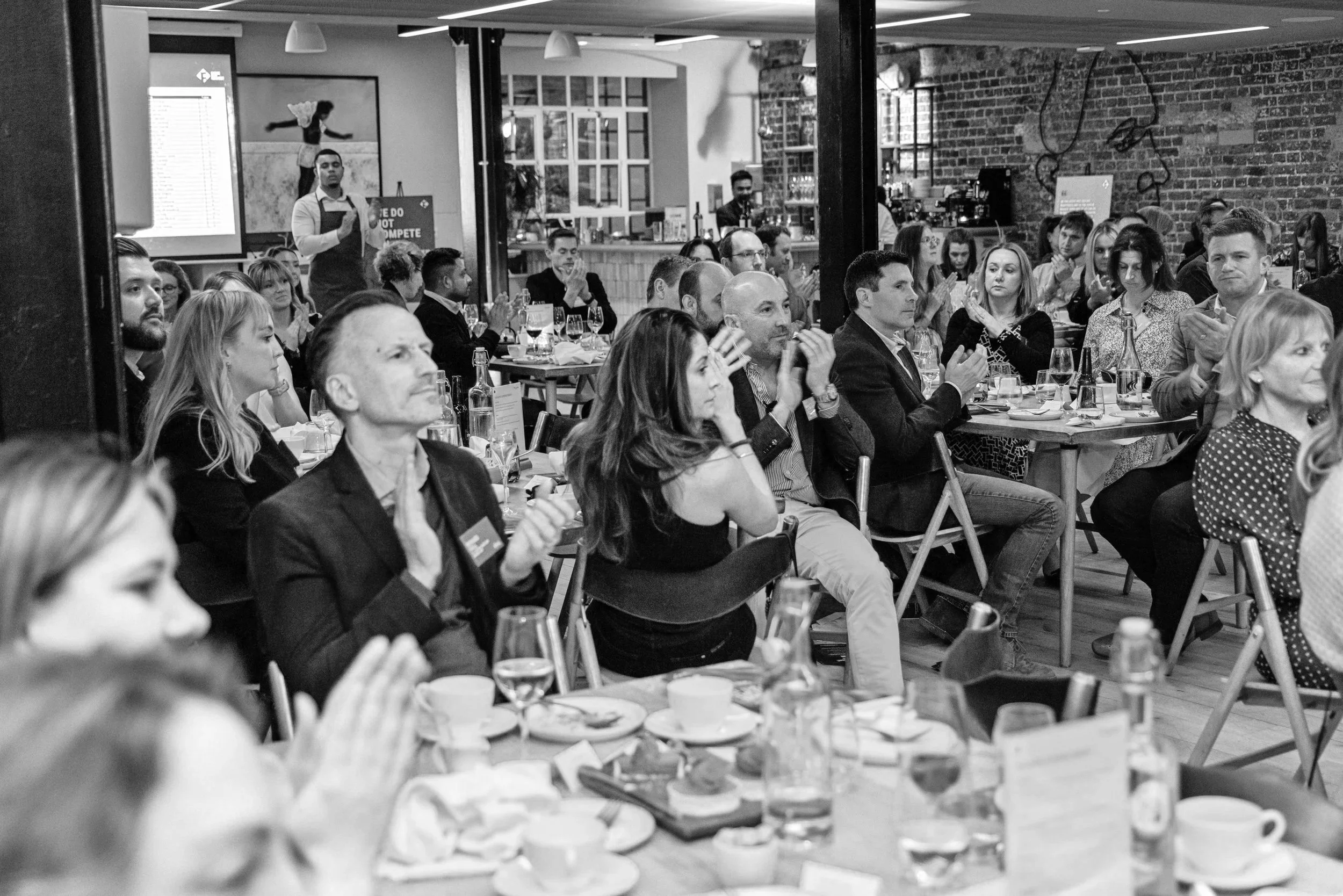
Meet the farmers
Farmers sit at the frontline of food system change. Their insight and lived experience are vital to solutions that are credible, commercially viable and grounded in reality. Through farmer-led working groups and advisory sessions, we bring producers into direct conversation with retailers, manufacturers and policymakers. This ensures the people who manage the land, steward natural resources and feed the nation help shape every decision.
Andrew Court
-
Andrew farms in partnership with his family in the heart of Staffordshire. Together, they run a mixed beef and arable enterprise, utilising regenerative farming techniques across 274 acres. Their herd of 100 Aberdeen Angus cattle are finished for Sainsbury's, while they continually develop their diverse arable rotation to produce high-quality grains for human consumption. Andrew works closely with organisations such as Severn Trent and LEAF on environmental and research projects. Aside from this, he pursues numerous educational and networking opportunities with accolades including; Just Farmers Scholar, Oxford Farming Conference Inspire Scholar, incoming chairman of the Farmers Under 35s, and Member of the Institute of Agricultural Engineers Council.
What changes do you want to see from the food industry in the transition to a sustainable system for nature, health and climate?
"I want to see a transition away from a dated, disjointed marketing system, where a farmer is truly disconnected from their customers, to a two way relationship where farmers and retailers can actively engage and converse with each other, so that they can collaborate to achieve both parties goals."
What inspired you to agree to be part of our Farmer’s Advisory Board?
"Simple, it's easy to sit and criticise and moan about challenges but we must take ownership of the challenges we face, and this is an opportunity to have a small part in potentially shaping the future of our sector."
Follow Andrew:
Instagram - @agcourt43
LinkedIn - Andrew Court https://www.linkedin.com/in/andrew-court-0a06ba203/
Anna Jackson
-
Anna's life seamlessly blends urban and rural experiences. Starting on a farm, she launched a sports photography business while managing the waste reduction non-profit 'A Zero Waste Life.'
When the pandemic hit, she returned to the farm, guided by her father and inspired by 'Dirt to Soil' by Gabe Brown, adopting regenerative farming practices. Their farm concentrates on arable cultivation, employing sheep for grazing and disease control. They've abstained from plowing since 2015 and adopted a no-till approach since 2020. Crop varieties include peas, a 10-way wheat blend, a three-way oilseed rape blend with clover, grass with clover, oats, and beans. They also rent land for pigs, contributing to a more sustainable rotation.
What changes do you want to see from the food industry in the transition to a sustainable system for nature, health and climate?
"Working with farmers and learning from farmers who are either sequestering carbon or working towards that goal is essential. Conducting trials with farmers and reducing overall chemical usage are key objectives. Furthermore, discussing the necessary income for farmers to achieve sustainability would be highly beneficial."
What inspired you to agree to be part of our Farmer’s Advisory Board?
"The prospect of contributing to positive change in an industry that needs it most!"
Follow Anna:
Instagram - @annaracheljackson @thepinkpigfarmLinkedIn - https://www.linkedin.com/in/anna-jackson-0154ba52/
Anna Bowen
-
Anna Bowen is a contract dairy farmer on a 300 cow spring block calving farm in Ceredigion. She also works off-farm as a farm business consultant specialising in dairy.
Ali Cargill
-
Ali farms regeneratively across wheat, potatoes, sugar beet, peas and oilseed rape, integrating cover crops, livestock and minimum tillage to build soil health and long-term resilience. He sits on the Future Food Movement Farmer-Led Working Group and the Executive of the Rural Economy Research Group in the House of Lords, helping shape national conversations on sustainable farming and rural policy
Ben Williams
-
Ben has accumulated nearly 20 years of experience in the pork and dairy sectors, engaging in farming, processing, and product supply. At AHDB Ben delivered knowledge exchange programmes for UK pork suppliers, undertaking R&D, commissioning and project managing but largely focused on turning that R&D into useful information, processes and resources for UK farmers. Areas of focus included on farm efficiency, behaviour change, novel feeds, fuels and fertilisers as well as sustainable farming solutions. Now serving as the Sustainability Manager for Leprino Foods, Ben plays a crucial role in supporting Leprino’s 400 contracted farmers in the production of sustainable dairy products. Ben remains involved in the butchering and processing aspects, on a smaller scale.
What changes do you want to see from the food industry in the transition to a sustainable system for nature, health and climate?
"A shift is needed, focusing on demanding action regarding efficiency and providing greater support for farmers to facilitate change at a faster pace, along with the necessary support to achieve it. There should be consideration on how we adopt and adapt to change, rather than relying solely on more legislation and technology, without addressing the systemic barriers to change. Encouraging greater collaboration across the supply chain and increasing education up the supply chain are crucial aspects."
What inspired you to agree to be part of our Farmer’s Advisory Board?
"Because attending events where the supply chain communicates expectations to farmers without a farmer's voice present is a common experience."
Bizza Walters
-
Bizza has spent 27 years immersed in rural life. A graduate of the Royal Agricultural University and the proud owner of a flock of Greyface Dartmoor and Romney sheep, Bizza combines hands-on experience with academic insight.
Charlie Curtis
-
As Head of Agriculture Sustainability for British Sugar, Charlie advises and supports thousands of sugar farmers on how to transition to a more climate positive way of farming, through the adoption of practices such as regenerative farming. Charlie's goal is to drive social, economic and environmental resilience in the farming industry.
Jack Pearce
-
Jack grew up around the family business on the coast in Northwest Norfolk with two big passions kitesurfing and food. He is the founder of a foodservice business, supplying locally grown and speciality foods to chefs. After developing this as far as he could, he merged it with another foodservice business, paving the way for Jack to join the main family business, Alfred G Pearce Ltd.
Jack is incredibly passionate about food production as well as his family business. Despite moments of disheartenment with the food system and challenges within the industry he maintains an optimistic outlook. Jack aims to leverage his position to forge meaningful commercial partnerships with customers. He strongly believes in the responsibility of the food and farming sector to speak up and educate consumers about the industry and the value placed on the food people eat.
What changes do you want to see from the food industry in the transition to a sustainable system for nature, health and climate?
"My personal belief is that our sector must do more to help consumers see the value in food and food production. The food industry at times feels like a zero-sum game to deliver the lowest cost to consumers, at any cost. This is fine but in doing this we have devalued where food sits in people’s household budgets, and the true value of food.
The UK has one of the lowest expenditures on food as a percentage of household income globally. If we are going to make changes towards a more sustainable food system, we need to ensure consumers are prepared to embrace this change. The cost cannot be placed solely on a supply chain that has been pushed to the very edges of profitability.
This is not a march for the food industry to profit or contribute to rampant food inflation. I believe UK retailers, if managed correctly, can offer the ideal checks and balances to ensure that while food might be getting more expensive, consumers are getting more value from it being grown and produced in a way that contributes to the world we live in rather than degrades it."
What inspired you to agree to be part of our Farmer’s Advisory Board?
"Simple, it's easy to sit and criticise and moan about challenges but we must take ownership of the challenges we face, and this is an opportunity to have a small part in potentially shaping the future of our sector."
Follow Jack:
Instagram - @jack_grows
YouTube - Alfred G Pearce LtdLinkedIn
Navaratnam Partheeban OBE
-
Navaratnam is a farm vet, he enjoys working with British livestock farmers in improving health, welfare, sustainability and production of their animals around the UK. His roles have varied from clinical practice, university higher education teaching, pharmaceutical industry and technical consultancy with a global animal health company. He has studied and consulted in a number of countries including Ireland, NZ, India, US, China, Sri Lanka and South Africa on dairy production. Other experiences include managing the health and running of a commercial calf rearing unit and sheep flock.
He is dedicated in working to support the sector in helping attract people from non-traditional backgrounds. Navaratnam is co-founder of British Veterinary Ethnicity and Diversity Society (BVEDS). He has been involved and is working on a number of projects to support this value.
Andy Knaggs
-
I am Head of Farming for Agrial in the UK, where we grow a wide range of outdoor and protected leafy salads across Essex and Suffolk. All of our crops are supplied to Agrial Fresh Produce, which provides washed, ready-to-eat salads to major UK retailers and foodservice customers, including quick-serve restaurants, through the Florette brand and customer own-label lines.
Farming is very much in my blood. I grew up on a small family farm in Yorkshire and went on to study agriculture at Writtle College. Over the past 20+ years I’ve been fortunate to work with several industry-leading businesses, gaining experience across procurement, supply chain, sales, and growing operations. It’s an incredible industry, often challenging, but hugely rewarding to work with nature to provide fresh food that benefits everyone.
I am a Board Director and Chair of the R&D Committee at the British Leafy Salads Association (BLSA), where I lead grower-led work on key industry challenges. This role allows me to connect research, policy, and on-farm practice, ensuring the sector has a strong, practical, and evidence-based voice.
I joined the Farmer Led Working Group because I believe farmers must be at the centre of shaping the transition to a sustainable food system. The changes I’d like to see include greater investment in farming research and technology, stronger collaboration and knowledge exchange, better promotion of UK food security, and more public education on what sustainable farming really means. Getting this balance right is essential if we are to protect nature, reduce food waste, and build resilience into the supply chain.
Tom Cannon
-
Tom Cannon from Roughway Farm is part of farming family that has farmed in Kent for generations. He has helped to diversify the family farm and has appeared on the BBC's Farmers Country Showdown and Marcus Wareing's Tales from a kitchen garden.
He is a Churchill Fellow and has travelled researching global hazelnut production in the US, Turkey, China and Australia. He is the Chairman of the Kentish Cobnuts Association whose mission is to Conserve and promote British Hazelnuts. He is also part of the 2026 OFC Inspire Programme.
Chris Woodhead
-
Chris operates a diverse farming venture in Kent, focusing on beef cattle, lamb, and goats. His early life involved living on a family farm until the age of 12, after which he moved to live with his mother following his father's passing. Despite initially pursuing a career as a gas engineer after leaving school, Chris felt a strong pull back to farming after contracting a nearly fatal virus abroad.
Facing the challenge that his father's land wasn't available for rent, Chris embarked on an extensive search, and through determination and effort, he successfully leased a field and acquired 32 in-lamb ewes. Over the course of six years, his business has experienced steady growth, despite setbacks along the way. This year, he successfully managed the lambing of over 500 sheep, and his goat herd has expanded to over 100, along with a herd of 10 cows, spanning across Kent.
What changes do you want to see from the food industry in the transition to a sustainable system for nature, health and climate?
"I would love to see greater support for British farmers, improved food labelling, and a shift towards appreciating the value of food. Currently we work tirelessly seven days a week, juggling a side job and managing a YouTube channel, just to make ends meet. It would be great to invite members to step onto the farm, to see the pressure on what we have to do just to keep things alive."
What inspired you to agree to be part of our Farmer’s Advisory Board?
"Education is vital for all people in the supply chain, from consumers to buyers to manufacturers, to see just how little antibiotics we use in the UK, to understand how margin sharing could reap huge benefits in supporting British to secure a more resilient food supply."
Follow Chris:
Instagram - @thesuperseriousfarmer
YouTube - @thesuperseriousfarmer
Chris Manley
-
Chris has dedicated his career to the food supply chain, working for large supermarkets and dairy and beef processors as an Agriculture Sustainability Manager. In this role, he offers strategic agriculture insight into the sourcing of beef, lamb, poultry meat, and dairy. His focus includes managing supply chains, achieving high standards of animal health and welfare, and leading projects with producers to promote sustainable and environmentally progressive farming practices.
"I am the eldest of two siblings and I grew up in a close farming family, near the village of Hemyock in the heart of the Blackdown Hills in East Devon. While my parents worked long, hard days on the farm, my childhood was spent reaping the rewards of open spaces, close farming community, and the joys of living life in wellies. Helping around the farm with the sheep, pigs, dairy and beef cattle, helped me to learn the values of a strong work ethos.
I give credit for my success to my involvement with the Young Farmers movement, where I joined aged 15, eventually rising to the elected position of National Chairman. Young Farmers was also the foundation that led me to securing my degree in Agriculture at Harper Adams University and having the confidence to take a sabbatical year as the elected Student Union President."
As a Nuffield Farming Scholar, Chris recently presented his report titled 'Leading your farm to success, by knowing yourself, your team, and your community.
What changes do you want to see from the food industry in the transition to a sustainable system for nature, health and climate?
Recognition and appropriate action taken on the following:
+ Nutritional requirements that are truly needed for people to be healthy
+ True cost of a sustainable farming system (financially and practically)
+ Complexity and interdependency required to achieve a significant change in behaviour to achieve long term sustainabilityWhat inspired you to agree to be part of our Farmer’s Advisory Board?
"I’m excited to learn, contribute and champion the positive contribution that a sustainable farming and food system can make to society."
Follow Chris:
Facebook - @chris.manley777
Instagram - @chris.manley777
Twitter - @chrismanley777
Fergus Lyon
-
Fergus Lyon is managing director of Easthall Farm in Hertfordshire, the first farm or estate to become an accredited B Corp in the UK (verified to meet high standards of social and environmental performance and transparency). Easthall Farm explores approaches to farming more regeneratively, aiming to grow food while being nature positive and a net sequesterer of carbon. Fergus is also a university professor researching social enterprise, food systems, natural capital markets, farmer clusters and biodiversity in business with projects funded by UK research councils and the Food, Farming and Countryside Commission.
Jon Myhill
-
Jon is an agronomist and delivers expert advice across all aspects of cropping, nutrient management, soil health and cover cropping. He develops tailored fertiliser strategies for farms, drawing on the latest trial data and working with both artificial fertilisers and a wide range of organic manures.
Tim Parton
-
Tim Parton is a farm manager in South Staffordshire and a world-renowned regenerative farmer/speaker/advisor.
Tim farms using biology and nutrition, to replace synthetic inputs, he does not use fungicides, insecticides, growth regulators and very few herbicides. Nutrition is key when growing plants that have a functioning immune system, to fight off pests and pathogens. Balance is everything in growing nutrient rich food. Once you get a soil working, miracles start to happen. Tim has total belief that biology has all the answers, we just need to ask the right questions! Tim is also a director of the Green Farm Collective, a group selling carbon, natural capital and certified regenerative produce. “We are what we eat. Let the regeneration of the planet and its inhabitants start today; we have no time to waste”.
Alasdair Hill
-
Bio coming soon
Will Oliver
-
Will is the fourth generation of his family to run his farm of around 2,000 acres (810 hectares) on the Leicestershire/Warwickshire border. The farm has a historical claim to fame, as it stands on the site where the Battle of Bosworth, the last significant battle of the War of the Roses, took place in 1485.
Once just arable, the farm now consists of a mix of enterprises, including sheds housing around 175,000 chickens, which are bought in as one-day-old chicks and reared until they are 39 days old when they go off to be slaughtered and sold to supermarkets.
The chickens’ manure is used as fertiliser on the farm’s fields, reducing the need to buy in man-made fertilisers, which have been becoming increasingly costly. Will grows wheat, maize and winter beans, all sold for animal feed. Some wheat is kept back to feed the chickens.
Other sources of income include a family-friendly glamping field accommodating six tents, a small herd of pedigree Aberdeen Angus cattle which are bred for beef, a dog walking field (let out by the hour), and several residential and commercial lettings. In addition there’s a livery yard, two fishing lakes and quarry, which are let out.
Andrew Jackson
-
Bio coming soon
Flavian Obiero
-
Flavian Obiero is a Hampshire County Farms tenant at Tynefield Farm in Titchfield. He manages 61 acres of permanent pasture & woodland with his partner Nikki. They have Tamworth pigs, ex dairy goats & a mixed breed sheep flock. All the animals are destined for meat. They currently sell through their catering business & a few markets. Future plans include selling to more local places & also setting up a butchery facility on farm.
What changes do you want to see from the food industry in the transition to a sustainable system for nature, health and climate?
"Actions speak louder than words. There's a lot of talk out there about supporting farmers, but without genuine backing, it's just noise. It all boils down to integrity and values."
What inspired you to agree to be part of our Farmer’s Advisory Board?
"If farmers struggle with their mental well-being and health, how can they care for the environment we all depend on? The supply chain requires attention and resolution on restructuring the cost of production. Addressing these issues is crucial because farmers cannot sustainably continue operating at a loss."
Follow Flavian:
IG & TikTok - @thekenyanpigfarmer
Twitter - @kenyanpigfarmer
Lucy Noad
-
Lucy farms in partnership with her husband in Wiltshire. Farming 225 hectares, they have a herd of 200 autumn – calving dairy cows, rear their replacement heifers and finish the beef cattle to fat for Tesco. Their long-term focus on achieving exceptional animal health has been their driving force. They are members of First Milk and have made radical changes to their system over the last 18 months to adopt regenerative farming practices across the farm. They have embraced this challenge, and it has led them to be part of the ADAS Climate Farm Demo, the AHDB Environment Baselining Pilot and a First Milk Pioneer farm and they enjoy opportunities to promote a positive future for British livestock farming. They also host community groups on the farm and Lucy is part way through her CEVAS training and is looking forwards to building positive relationships with local schools. Lucy has recently been nominated to stand for election to Farmer Council for First Milk.
Becca Hesketh
-
Bio coming soon
Johnny Wake
-
Bio coming soon
Millie Fyfe
-
Milly Fyfe is a Farmer, Mum of two young children, home cook and farming communicator, who set up a food blog called No Fuss Meals for Busy Parents during the height of the pandemic. She has worked and volunteered with numerous farming charities and organisations so deeply understands some of the challenges faced. Milly would post on social media about life on the farm, what was growing in her kitchen garden and then involve her children in the growing, harvesting and cooking of simple meals that her friends would replicate or become inspired by.
This project commenced in September 2020 and has been completely self funded until it was registered as a CIC in April 2023. The aim has always been to provide a connection between food produced in the UK and how to make a tasty meal with engaging content on social media.
Milly sees the benefits of scratch cooking for a whole host of reasons. It supports good health and wellbeing, promotes positive mental health, provides a connection with what we are eating and sustaining rural communities too with job opportunities, tourism and access to services.
The long-term impact of the project will be that children will grow up eating a variety of home cooked meals and less of a reliance on highly processed meals. Informed choices and cooking habits will change as parental knowledge will have been enhanced and this will instil long term benefits to the next generation of young adults.
Marcus Ferraro
-
Bio coming soon
Cynog Davis
-
Bio coming soon
Dr Annie Raynor
-
Annie is a food systems researcher with extensive experience in the agri-food sector. She applies a systems-thinking approach to drive transformational change in livestock production, working with farmers, governments, universities, major food brands, and policymakers. With a deep understanding of the complexities of the food system, she helps ignite new ideas that shape the future of sustainable and ethical food production.
Her expertise spans farm animal welfare, regenerative agriculture, and sustainable sourcing. She holds a PhD in positive animal welfare and has contributed to several influential scientific publications. Annie also sits on advisory boards for organizations such as the RSPCA, the Soil Association, and the Animal Welfare Research Network and is the chair of the Farm Animal Welfare Forum. Annie is a co-founder of Planton Farm and Impeckable Poultry.
Jeremy Buxton
-
Jeremy is a regenerative farmer managing a mixed family farm in Norfolk, combining arable crops, beef, pigs, and agroforestry. Jeremy spent 12 years in Paris working in television as an editor, cameraman, executive producer, and presenter. Now back on the land, he grows for Wildfarmed and sells all livestock through the farm shop. Passionate about sustainability and education, Jeremy uses the farm as a platform to engage the local community, fostering awareness of farming, food production, nutrition, biodiversity, and the challenges of climate change.
Sophie Gregory
-
Sophie is a first-gen organic dairy farmer, managing with her husband 1400 acres across Dorset, Devon, and Somerset. Sophie swapped accountancy for cows, and with her partner Tom lacking a family farm to inherit, they started from scratch. They milk 400 cows—Friesians, Jerseys, and Shorthorns—chosen for longevity, milk solids, and efficient grass conversion. Their milk goes to Arla, and as active members, they participate in farm filming, public talks, school visits, and Open Farm Sunday. They love the outdoors, their animals, and engaging with the public.
Sophie is also undertaking a Nuffield farming scholarship at the moment, involving looking at the future of organic across the world. Having fallen in love with the industry, Sophie Gregory's mission is clear: "Farming is a great place to work, and everyone should have access to it."
What changes do you want to see from the food industry in the transition to a sustainable system for nature, health and climate?
I would love to see the nutritional density of food valued. A supply chain that rewards farmers for making good environmental choices on farm. But the whole thing underpinned by a decent living for farmers enabling them to reinvest in their farms. Healthy food equals healthy people and healthy planet.
Vicki Lintern
-
Bio coming soon








